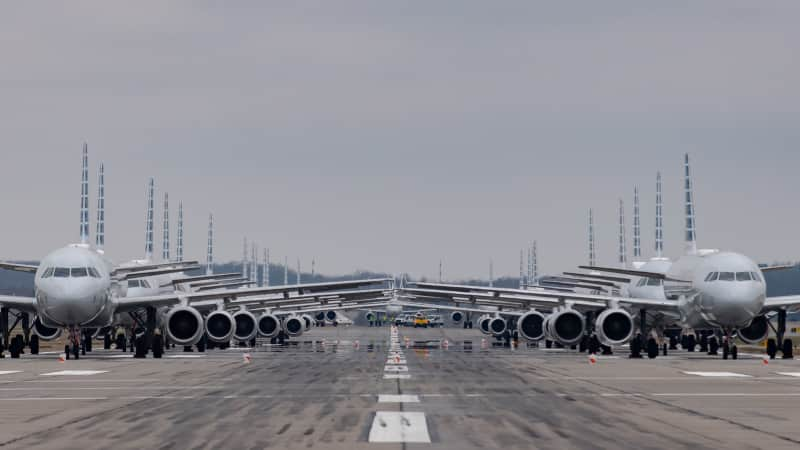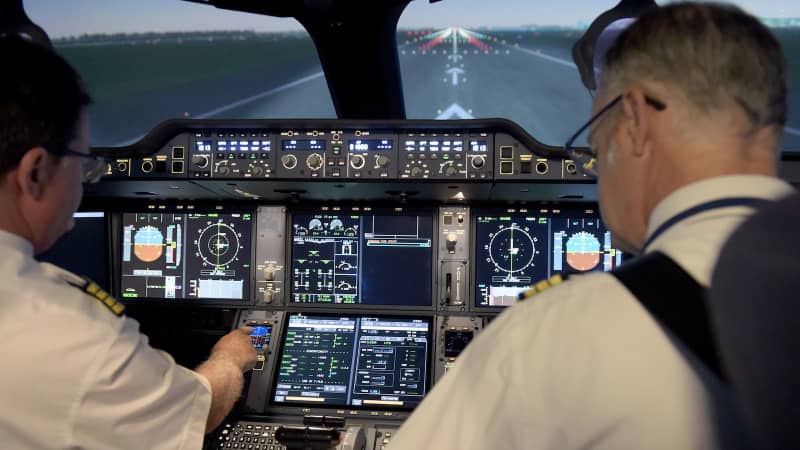(CNN) — The coronavirus pandemic has grounded most of the world’s airplanes for the immediate future.
But when aviation eventually reboots, pilots will need to be up to speed.
That doesn’t just mean polishing their Ray-Bans and dusting off their navy-blue blazers. It means brushing up on flight-deck skills and ensuring they keep within the boundaries of aviation’s stringent safety regulations.
And that is presenting a looming challenge as pilots remain housebound.
“Pilots require frequent training and ‘recency’ to be able to fly,” says Brian Strutton of the British Airline Pilots Association, or BALPA, which represents the interests of all UK pilots.
“Recency” means complying with regulations that stipulate a pilot must have successfully carried out three takeoffs and landings — one of which using the cockpit’s autoland facility — within the previous 90 days.
To qualify for flying both at daytime and night-time, commercial pilots also need to perform three night-time take-offs and landings within the 90 days, which are harder because the pilot has less visual cues. This covers the three daytime take-offs and landings as well.
But there are other annual checks, as well.
These include the License Proficiency Check, which a pilot would have to do every year to keep their pilot’s license valid. Also, the airline that the pilot flies for will have to perform an Operational Proficiency Check every six months.

Airlines around the world have been forced to park their planes due to the coronavirus pandemic.
Jeff Swensen/Getty Images North America/Getty Images
“Most of these checks could be conducted in what is known as a ‘D level’ simulator,” says Adam Twidell, an experienced pilot and CEO of PrivateFly, a booking platform for on-demand jets.
These are the most realistic and offer the highest definition and lifelike responses — just like flying the real thing.
But for that to happen, simulators need to be available. In the UK, for example, many facilities offering simulators are closed.
There is also the issue of the availability of instructors and examiners to conduct checks. A co-pilot also needs to be present.
“There’s going to be a significant backlog of available simulator slots. When airlines do want to get back to normal operations they won’t be able to do it instantly,” Twidell tells CNN Travel.
Expense is an issue, too. Simulator time costs around $300 to $400 an hour, and that’s without the necessary associated personnel. It’s all an enormous undertaking.

Air France pilots sit inside an Airbus A350 flight simulator at the company training centre near Roissy Charles de Gaulle airport.
ERIC PIERMONT/AFP/AFP via Getty Images
Additionally, there are regular fire and smoke training requirements, where pilots have to go into a smoke-filled aircraft and evacuate it. There are also first aid courses and crew resource management training, which involves assessing how crew members work together as a team.
Combine the complexity of the different types of training and certifications that flight crew might have to catch up on if the grounding persists for a prolonged period with the fact that the majority of the world’s 290,000-plus active pilots are sitting at home, and the scale of the imminent problem becomes all too apparent.
Pushing the boundaries
To help alleviate the pressure accumulating from the potential expiration of the pilots’ medical certificates and ratings (additional elements of the pilot’s license that allows them to fly specific types of aircraft), time extensions are being granted worldwide by regulatory authorities.
Across Europe, the EU Aviation Safety Agency, or EASA, has extended the deadlines for certain requirements on condition that each airline comes up with a detailed pilot training plan that the agency will assess. If it’s a credible plan, an extension could be granted.
In the United States, the Federal Aviation Administration’s assistant chief counsel for enforcement, Naomi Tsuda, says that, due to the extraordinary circumstances related to the pandemic, the FAA will not take legal action against pilots in cases of noncompliance with medical certificate duration standards if their certificate expires between March 31 and June 30, 2020.
“The FAA will reevaluate this decision as circumstances unfold, to determine whether an extension or other action is needed to address this pandemic-related challenge,” said Tsuda in an FAA Notice of Enforcement Policy.
In the UK, the Civil Aviation Authority, in line with EASA guidance (while the UK is still in the EU), has exempted all operators, aircrew, instructors and examiners engaged in commercial air transport from the normal validity periods for licenses, certificates and ratings that expire before October 31, 2020.
Deferring the expiry of licenses and certificates is certainly helpful. But all of this is incredibly stressful for the airlines’ workforces.
Staffing issues
The world’s longest and largest twin-engine airliner, the Boeing 777-9X, has completed its first test flight from Boeing’s wide-body factory near Seattle.
“Over 40 airlines have grounded their entire fleets, including airlines like EasyJet, and the majority of others have grounded 80-90% — it’s just unheard of. That gives you an idea as to how many pilots are not flying aircraft,” says Sam Sprules, managing director at pilot recruitment agency AeroProfessional.
Sprules tells CNN that a lot of flight crew are either grounded on minimal pay or being asked to take unpaid leave for the next couple of months.
In some countries, airlines are operating from the furlough or pay subsidy schemes, and in worst case scenarios crew are being terminated.
“Recruiting of flight crew has pretty much dried up at the moment while airlines are rightly focusing on trying to consolidate their finances just to survive,” he says.
This is a colossal body-blow to an industry that was booming before the Covid-19 crisis took hold. However, Sprules also says that a small minority of aviation businesses are taking an optimistic approach, believing that recovery will be sooner rather than later.
“What they want to do is keep their recruitment moving to capitalize on the fact that there are a lot of skilled crew in the market right now.”
Face-to-face interviews are now replaced with online tools such as Microsoft Office Teams or Skype. Airlines can build up pools of candidates so that as soon as the sector is back into recovery mode and restrictions start to subside they can jump into action.
“We are doing that with a few of our clients — conducting applicant gathering and documentation screening and getting candidates to a point where we can go no further, until things start to move again,” says Sprules.
“You start forgetting things”
So besides using computer simulators, how can pilots stuck at home keep their cockpit skills honed?
Karlene Petitt, a US-based Boeing 777 pilot and author of “Normalization of Deviance: A Threat to Aviation Safety,” tells CNN that pilots could use this time of grounding for educational improvement.
She says that in an age where certain aspects of the flight deck are automated, pilots need to know, procedurally, how to set up the flight deck, which buttons to push and which checklists to read.
“You start forgetting things if you don’t use them,” she says. “And much of what we, as pilots, do is cognitive based. If you can keep that alive, then you’re not going to lose proficiency.
“It would be nice if the airlines made available online training tools that we had during initial training or during initial type rating, so we could go and maintain proficiency while at home, until we get back into the sky.”
Carriers could also have the ability to track and see which of their pilots are actually utilizing those tools, says Petitt, adding that even a home-made low-tech approach could be beneficial too:
In the past, when Petitt was “out of the cockpit” for a couple of years in the days before online pilot training was an option, she made flashcards and what she calls a “paper trainer,” a sort of wall poster, to practice cockpit procedures at home.
“We did this years ago. You just physically move and touch the button because the motion of actually touching where you would be touching in the airplane helps to instill it into memory.”
The well-being factor
Joji Waites, flight safety specialist at BALPA, tells CNN that his organization is ensuring that the few crew that are still flying (on cargo, medical, repatriation, and a few scheduled services) are equipped with protective kits where necessary, and checking that aircraft are properly cleaned.
“For those that are not flying — those that are furloughed — the shift is towards well-being,” says Waites.
Beyond the practicalities of brushing up procedural skills, pilots need to keep their minds in good shape too.
Flight crew are used to quite a structured way of working and are conditioned to knowing what is coming up in the next month in terms of their flight schedules.
Waites says that BALPA has been sharing, with its members, mental health and well-being tips from the MIND Charity and from Public Health England.
“There are specific resources available,” says Waites. “And there is a requirement coming out later this year in August for airlines to have a peer support network program staffed by pilots for pilots for them to raise, confidentially, concerns of well-being and mental health.”
Many airlines already have these in place ahead of when the regulation comes out, pointing pilots towards those facilities within their airlines where they can share concerns, by “having people to talk to about their anxieties and what they are going through.”
“Pilots are not used to sitting around,” says Waites. “We’re thinking ahead to the time when things hopefully resume and scheduled flights start up.”
